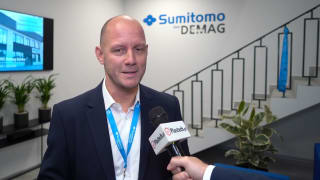 At the launch in North America, ENGEL will be demonstrating iQ flow control live at NPE2018, from May 7th to 11th in Orlando, Florida. The integrated temperature-control solution improves the stability of injection molding processes, reduces rejects and boosts energy efficiency.
At the launch in North America, ENGEL will be demonstrating iQ flow control live at NPE2018, from May 7th to 11th in Orlando, Florida. The integrated temperature-control solution improves the stability of injection molding processes, reduces rejects and boosts energy efficiency."Most rejects in injection molding are the result of temperature control errors," says Joachim Kragl, Director of Advanced Molding Systems and Processing at ENGEL Machinery Inc. in York, Pennsylvania. "This explains why the processors' focus is increasingly shifting to mold temperature control." With flomo, ENGEL laid the groundwork for more transparency and consistency in the temperature control process as one of the pioneers in this field back at K 2010. ENGEL flomo, an electronic temperature control water manifold system, replaces the maintenance-intensive cooling water distributors and even the basic version can individually monitor and document all cooling and temperature control circuits. The next generation e-flomo is further able to actively control either the flow rates or the temperature difference (ΔT) in all individual circuits. The advantage of ΔT control is the automatic setting of the individually required flow rate for each temperature control circuit.
On-demand pump control
iQ flow control sees ENGEL taking the next step. The software networks the temperature control units and the injection molding machine to create a single unit and, based on the measured values determined by e-flomo, controls the pump speed in the temperature control units on demand. While e-flomo increases the process stability which consequently reduces the risk of rejects, automatic speed adjustment ensures that temperature control requires substantially less energy.Since the pump operates on-demand rather than at maximum output all the time, stress on moving parts is reduced and temperature control units have a longer service life, which makes it possible to extend the maintenance cycles. This allows for further substantial savings. In conventional operations, regular maintenance of the temperature control units, including the downtime associated with it, is a major cost factor.
As an integrated solution, the entire temperature control process can be set up, monitored and centrally logged at the CC300 machine control display while the ideal operating point for the particular temperature control unit is determined and set automatically. This allows injection molding shops to fully leverage their injection molding machines' potential without the system operators needing special training.
Self-optimizing machine
To integrate the temperature control units with the CC300 control unit on the injection molding machine, ENGEL collaborated with temperature control unit manufacturer HB-Therm (St. Gallen, Switzerland), to develop the temperature control unit series known as e-temp. The extremely compact devices are networked with the injection molding machine via OPC UA (Open Platform Communication Unified Architecture). With its service-oriented, platform-independent and freely scalable structure, this communications model offers great flexibility. A high degree of data security is guaranteed by the technical safety features that are an integral part of the architecture.OPC UA is becoming increasingly popular in the plastics industry for networking injection molding machines, peripherals, sensors and applications and is an important component of the inject 4.0 platform by ENGEL. Thanks to inject 4.0, ENGEL is helping clients pave the way to the smart factory, with continuously self-optimizing production processes. Self-regulating systems such as iQ flow control play a key role in creatring smart machines.

Thanks to the e-temp temperature control units, ENGEL has become a system solutions provider in the field of temperature control of injection molding processes.
Source: ENGEL




